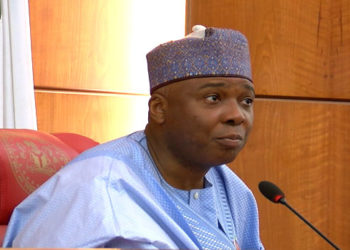
That the oil and gas industry is strategic to Nigeria’s economic performance is no longer a topic for debate. That the nation’s oil and gas industry is faced with many challenges is no news. As a matter of fact, the opacity that currently surrounds the operations of NNPC, the country’s national oil company, remains a mountain to dismantle in our strive for transparency. But to exclusively focus on the many scandals that have ravaged the industry in the past and presently will result in repudiation of the gains the industry has recorded. One of such gains is the Egina Floating Production Storage and Offloading Vessel (FPSO) that recently arrived in Lagos. The strategic importance of the Egina field is apparent in its remarkable attributes. The Egina field discovered in December 2003 is touted to have estimated oil reserves of 550 million barrels, and expected to add 200,000 barrels of crude oil to the current daily production capacity of the country. The field was actually discovered when the Egina-1 well was drilled. Subsequent drillings resulted in the discovery of vast oil deposit, which led to the conception of the development of a new Floating Production Storage and Offloading Vessel (FPSO) dedicated to the field.
The recent arrival of the Egina FPSO is a significant leap in the oil and gas industry in Nigeria. That the vessel could berth successfully in Nigeria is also a plus for the nation’s maritime industry. The project is worthy of commendation and celebration on many sides. The FPSO measures 330m in length, 61m in width and 33.5m in depth, and has an oil storage capacity of approximately 2.3 million barrels. It is regarded as the largest vessel in Africa, which probably explains the $15billion expended on it.
Contrary to feelings in the industry, the senate believes there should be a thorough appraisal of the project in its entirety. In this regard, the senate conducted an investigative hearing inviting the Nigerian National Petroleum Corporation (NNPC), Total Upstream Nigeria Limited, TUPNI, and Nigerian Content Development Monitoring Board (NCDMB) in order to ascertain the level of local content adherence and cost effectiveness of the project. The submissions by the representatives of the invited organisations show a considerable level of adherence to the local content policy of the government. According to the Executive Secretary of the NCDMB, Mr. Simbi Wabote, Total Nigeria complied with the Nigerian local content initiatives, considering that Egina is the first FPSO project agreement to be signed and undertaken after the Nigerian Oil and Gas Industry Content Development, NOGICD, Act was instituted in 2010. According to the Managing Director of Total Nigeria, the project represents a workload of 24 million man-hours worked in Nigeria, or 77 per cent of total project workload, equivalent to a workforce of 3,000 persons on average during five years.
However, the Senate Ad-hoc Committee has resolutely called for a value-for-money audit of the $16 billion Egina FPSO vessel contract to ascertain the veracity of its suspicion or otherwise. The legislators also threatened to withhold support other projects of similar stature, such as the Bonga South-West and Zabazaba FPSO projects; two projects with a production capacity of 150,000 barrels per day upon completion. This latest move by the Senate Committee is where my reservation lies. Stalling major projects that will add extensive value to the Nigerian oil and gas industry, just to ascertain the value for money on a concluded project is rather questionable. Facts in the public domain suggest that like every other project, figures were reviewed and revised to reflect prevailing economic circumstances. It is instructive that the initial budget of $16,354 billion was revised to $15.75 billion in May 2013 and the Final Investment Decision was made on the basis of this reduced budget figure. In other words, there was a downward review of the project and it was executed at that figure.
Whilst every measure to curb corruption in the country is appreciated, it must be done with recourse to the overall socio-economic impact. Stalling the execution of other projects in the oil and gas industry will impact not only the industry, but other ancillary industries and the Nigerian economy at large. The execution of the Bonga and Zabazaba project promises to create thousands of jobs and expand local content opportunities, especially now that the country is experiencing a disturbing unemployment rate. As provided by the laws of the land, the senate has the powers to carry out its oversight function on any government parastatal or institution of public interest. And as representatives of the Nigerian people, it is perfectly tolerable to look into the entirety of the project. However, it will be detrimental to foreclose other projects while the audit is actuated. In any case probes were conducted into similar projects in the past and nothing tangible came out of them. If we must, let the forensic audit continue, and let the Bonga and Zabazaba projects continue as planned.